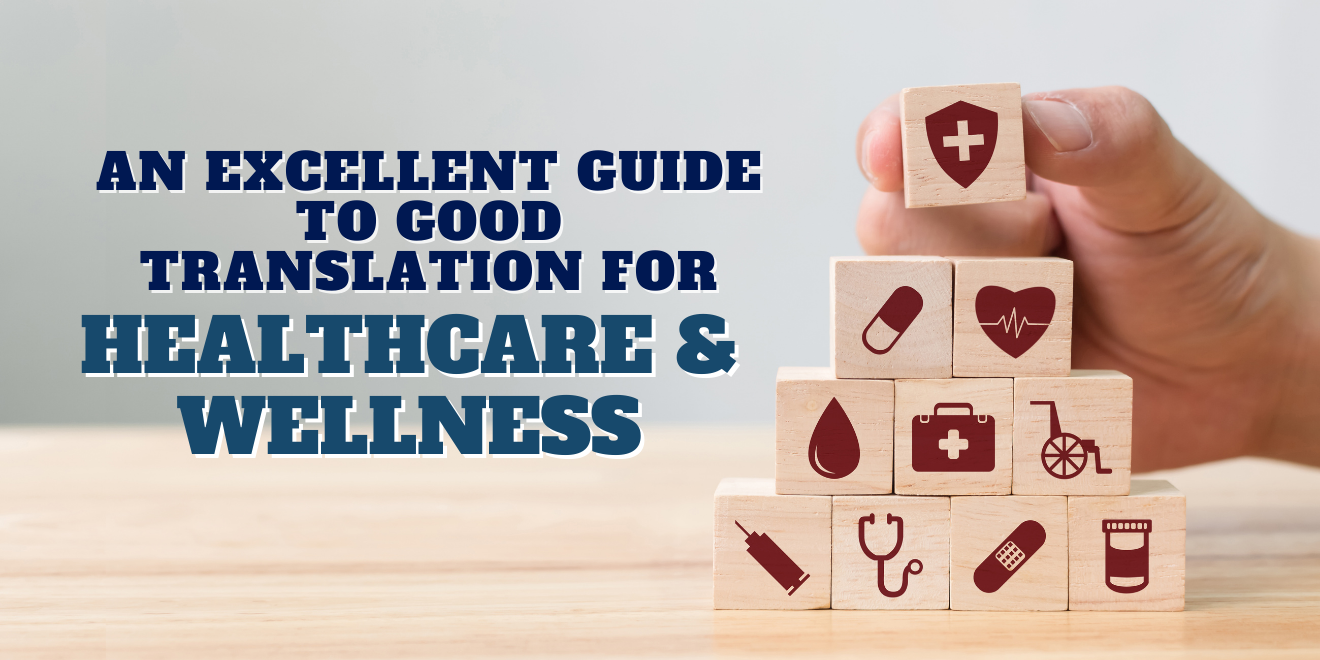An Excellent Guide to Good Translation for Healthcare and Wellness

The medical and wellness industry is one of the most competitive industries out there. A significant part of this competition comes from translating content into different languages to make it more easily understandable for patients worldwide.
Many translators don't have a background in health care or wellness and often make mistakes when they translate terminology. This blog post will teach you to find good translation services from experts who understand your industry while avoiding pitfalls like these.
The first step is to work with a company that understands your target audience. The translators you'll be working with should have experience in health care or wellness and understand the most important terms for patients and clinicians. For example, they might not know how to translate "adrenal gland" as "suprarenal gland."

They'll also know how much medical jargon to add into specific contexts (e.g., Wikipedia vs. scientific paper). This will help them create content that accurately reflects these nuances without confusing readers and losing customers.
Good translation providers will ask questions about your industry before providing quotes, so make sure yours does too. If they don't do this when asking for a quote, then chances are they'll be more likely to make mistakes in the translation. The key is finding translators who understand your industry and can deliver quality content.
Another mistake people make when translating content is that they don't consider the needs of their clients. Translators should always ask about the purpose and audience before working on a project which means asking questions like "Who are your target customers?" or "Why do you need this translation?".
This helps translators create better content for future projects because it allows them to understand what kind of information your company wants to convey. In addition, these translators will be able to use more advanced terminology in medical fields such as anatomy to avoid making mistakes like using simple words instead of scientific ones.

They'll also have marketing experience to combine the right amount of technical language in a way that's easy for patients to understand, which is an important part of medical translation. The best translators will also be familiar with your brand and what it represents.
This means you should work with companies who know how your industry works and provide services tailored specifically to these needs. They'll save you money in the long run by making sure every project goes smoothly while ensuring good quality content.
Another common mistake people make when translating content is that they don't consider the differences between cultures. For example, using slang words or idioms can confuse patients who aren't familiar with these terms.
Thus, it would be best if you worked with a company that understands what your customers are used to hearing and how this relates to their cultural background. A good translation provider will seek to understand the target group to create better translations over time without making mistakes like these.

The best companies also employ native speakers from each country and region to get more accurate information during translation. While English may not cause issues, there are some regions whose dialects have slightly different word meanings, which can significantly impact the overall message you want to convey.
A good company will know how this works and can provide more accurate translations as a result. That means they'll be able to avoid mistakes like using words or phrases that aren't appropriate for your audience.
If you're looking for a good translation provider, it's essential to choose one that understands your industry and has experience with medical content.
They'll know how much jargon is appropriate depending on the context, and they'll be able to provide quality translations over time without making mistakes. In addition, make sure your providers are familiar with your brand. This means working with companies who understand how this industry operates and its role in society so you can get accurate information during translation.
Good translators will also ask questions about your company before quoting prices, so work only with those who do.
Turian da Silva Bielschowsky is the founder and managing director of Magma Translation, a leading translation, website localization, and Internet marketing, provider. He is also a person with a social consciousness that supports NGOs, such as Rede Postinho and many others around the globe.
Many translators don't have a background in health care or wellness and often make mistakes when they translate terminology. This blog post will teach you to find good translation services from experts who understand your industry while avoiding pitfalls like these.
1. Look for a Company that Understands the Target Audience
The first step is to work with a company that understands your target audience. The translators you'll be working with should have experience in health care or wellness and understand the most important terms for patients and clinicians. For example, they might not know how to translate "adrenal gland" as "suprarenal gland."

They'll also know how much medical jargon to add into specific contexts (e.g., Wikipedia vs. scientific paper). This will help them create content that accurately reflects these nuances without confusing readers and losing customers.
Good translation providers will ask questions about your industry before providing quotes, so make sure yours does too. If they don't do this when asking for a quote, then chances are they'll be more likely to make mistakes in the translation. The key is finding translators who understand your industry and can deliver quality content.
2. Choose a Company that Understands the Needs of the Clients
Another mistake people make when translating content is that they don't consider the needs of their clients. Translators should always ask about the purpose and audience before working on a project which means asking questions like "Who are your target customers?" or "Why do you need this translation?".
This helps translators create better content for future projects because it allows them to understand what kind of information your company wants to convey. In addition, these translators will be able to use more advanced terminology in medical fields such as anatomy to avoid making mistakes like using simple words instead of scientific ones.

They'll also have marketing experience to combine the right amount of technical language in a way that's easy for patients to understand, which is an important part of medical translation. The best translators will also be familiar with your brand and what it represents.
This means you should work with companies who know how your industry works and provide services tailored specifically to these needs. They'll save you money in the long run by making sure every project goes smoothly while ensuring good quality content.
3. Choose a Company that Understands the Locals Better
Another common mistake people make when translating content is that they don't consider the differences between cultures. For example, using slang words or idioms can confuse patients who aren't familiar with these terms.
Thus, it would be best if you worked with a company that understands what your customers are used to hearing and how this relates to their cultural background. A good translation provider will seek to understand the target group to create better translations over time without making mistakes like these.

The best companies also employ native speakers from each country and region to get more accurate information during translation. While English may not cause issues, there are some regions whose dialects have slightly different word meanings, which can significantly impact the overall message you want to convey.
A good company will know how this works and can provide more accurate translations as a result. That means they'll be able to avoid mistakes like using words or phrases that aren't appropriate for your audience.
Conclusion
If you're looking for a good translation provider, it's essential to choose one that understands your industry and has experience with medical content.
They'll know how much jargon is appropriate depending on the context, and they'll be able to provide quality translations over time without making mistakes. In addition, make sure your providers are familiar with your brand. This means working with companies who understand how this industry operates and its role in society so you can get accurate information during translation.
Good translators will also ask questions about your company before quoting prices, so work only with those who do.
About the Author:
Turian da Silva Bielschowsky is the founder and managing director of Magma Translation, a leading translation, website localization, and Internet marketing, provider. He is also a person with a social consciousness that supports NGOs, such as Rede Postinho and many others around the globe.




































































































